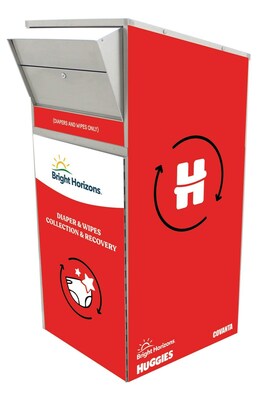Huggies® and Bright Horizons® Pilot New Program to Divert Waste from Landfills and Convert Waste-to-Energy in Local Boston Communities
- None.
- None.
Insights
The initiative by Kimberly-Clark to convert used diapers and wipes into energy forms such as electricity and heat is a significant step toward environmental sustainability. This process, known as Waste-to-Energy (WtE), involves the thermal treatment of waste materials to generate energy. By diverting thousands of pounds of trash from landfills, the pilot program not only reduces methane emissions—a potent greenhouse gas—but also provides a new stream of renewable energy.
From an environmental perspective, the key benefits include the reduction of landfill space usage and the conservation of natural resources by offseting the need for conventional energy sources. However, it is crucial to assess the efficiency of the WtE conversion process and its potential emissions to ensure that the environmental benefits outweigh the impacts of the technology itself.
For stakeholders, the short-term implications involve monitoring the pilot's success in terms of both waste reduction and energy generation. In the long-term, if successful, this could pave the way for broader adoption across the industry, leading to significant environmental benefits and potential cost savings for both Kimberly-Clark and participating child care centers.
From a market perspective, Kimberly-Clark's pilot program represents a proactive approach to corporate social responsibility, which could positively influence consumer perception and brand loyalty, especially among environmentally conscious consumers. The diaper market is highly competitive and differentiation through sustainability initiatives can be a key factor in consumer decision-making.
Investors and analysts will be observing the program's scalability and its impact on Kimberly-Clark's operational costs. If the Waste-to-Energy conversion proves cost-effective, it may lead to operational efficiencies and potentially open up new revenue streams, such as selling excess energy. This could have a positive effect on the company's financial performance and stock valuation in the long run.
It is also worth noting that such innovative waste management solutions could influence regulatory policies and incentives, potentially benefiting companies that are early adopters of environmentally friendly practices.
Turning waste into energy is a concept that aligns with the broader trends in the energy sector towards sustainability and renewable energy sources. The process of Waste-to-Energy can be complex and capital intensive, but it also offers a dual benefit: reducing waste and creating energy. The pilot's success could signal a viable path for other companies in the consumer goods sector to manage waste more effectively and contribute to the transition to a low-carbon economy.
For the energy market, the integration of such WtE projects could diversify the energy mix and provide grid stability through distributed generation. However, the actual impact on the energy market would depend on the scale of adoption and the efficiency of the technology used.
Energy sector stakeholders should consider the potential for partnerships with consumer goods companies and waste management firms, as well as the implications for energy policy and infrastructure development.
The pilot aims to offset the environmental impact by turning it into electricity, heat, or fuel
"Huggies is passionate about providing innovative solutions to better serve consumers and communities," said Matt Barresi, North American Vice President of the Huggies Brand. "Whether it's having the original Leak Lock® blowout blocker since 1997, a
Waste-to-Energy technology, a process managed by our partners at Covanta, offsets the use of fossil fuels and reduces carbon emissions and methane generation from landfills at many facilities around
"Diaper waste in landfills has been an ongoing concern for our local families, and we're thrilled to partner with Huggies to help make a positive environmental impact in the
The pilot will run at select
About Bright Horizons Family Solutions Inc.
Bright Horizons® is a leading global provider of high-quality early education and child care, back-up care, and workforce education services. For more than 35 years, we have partnered with employers to support workforces by providing services that help working families and employees thrive personally and professionally. Bright Horizons operates approximately 1,050 early education and child care centers in the
About Kimberly-Clark
Kimberly-Clark (NYSE: KMB) and its trusted brands are an indispensable part of life for people in more than 175 countries. Fueled by ingenuity, creativity, and an understanding of people's most essential needs, we create products that help individuals experience more of what's important to them. Our portfolio of brands, including Huggies, Kleenex, Scott, Kotex, Cottonelle, Poise, Depend, Andrex, Pull-Ups, GoodNites, Intimus, Plenitud, Sweety, Softex, Viva and WypAll, hold No. 1 or No. 2 share positions in approximately 80 countries. We use sustainable practices that support a healthy planet, build strong communities, and ensure our business thrives for decades to come. We are proud to be recognized as one of the World's Most Ethical Companies(R) by Ethisphere for the fifth year in a row. To keep up with the latest news and to learn more about the company's 150-year history of innovation, visit kimberly-clark.com.
*vs Huggies® Simply Clean®
KMB-B
KMB-S
![]() View original content to download multimedia:https://www.prnewswire.com/news-releases/huggies-and-bright-horizons-pilot-new-program-to-divert-waste-from-landfills-and-convert-waste-to-energy-in-local-boston-communities-302082963.html
View original content to download multimedia:https://www.prnewswire.com/news-releases/huggies-and-bright-horizons-pilot-new-program-to-divert-waste-from-landfills-and-convert-waste-to-energy-in-local-boston-communities-302082963.html
SOURCE Kimberly-Clark Corporation
FAQ
What is the purpose of the pilot program involving Kimberly-Clark's Huggies Brand and Bright Horizons?
What are the expected outcomes of the pilot program?









